#Serbo-croatian
Explore tagged Tumblr posts
Text
I really hope Duolingo releases a course on that language spoken in Croatia, Serbia, Montenegro and Bosnia and Herzegovina that is mutually intelligable between all of those regions. It'd be funny to see them squirm trying to figure out how to represent it.
My two cents would be to call it Serbo-Croatian, give it a new flag that mixes those two countries' national flags Austria-Hungary style or use the flag of Yugoslavia to depict it and do it in the more common latin script, or perhaps make it the first bi-script course.
Interested to hear the thoughts or feelings of others though. Beyond the meme of "funny Balkan infighting" I do think it would be really nice to see the language reach a wider audience and I personally would love to learn it if they made a course.
5 notes
·
View notes
Text
It's cute to learn about your partners heritage and I like learning new languages. But I don't know how to explain to my father in law that all my Serbo-croatian comes from eurovision.
3 notes
·
View notes
Text
Ljudožder - BoA
💿 Ritam Strasti Yugoslavia, 1982
1 note
·
View note
Text
i happen to be generally quite fond of exonyms and calques, but imho translating proper names (and toponyms and so on) should only be mandatory if they come from languages closely related to the language one is translating into—say, no more than one order of magnitude removed from their earliest demonstrated common ancestor (limiting mandatory translations in english to other germanic languages). insisting on calling belgrade 'whiteyard' or whatever would be rather silly, but i quite like the idea of referring to brussels (from middle dutch 'broekzele') as 'brooksale' ('sale' in the sense of 'hall') or to frankfurt as 'frankfort'. double points if the close relation between the languages allows for the calqued name to be formed in the exact same manner as the original—it is, for instance, perfectly possible to translate the name of oslo using the native (and cognate) english suffix -ley, 'osley'
(moreover, i think the number of calques should ideally be maximised by taking advantage of existing calques in languages closely related to one's own—the english should, for instance, make use of icelandic 'kænugarður' and solve the kiev/kyiv dispute by referring to the city simply as 'canyard')
#post brought to you by me hearing some imbecile use the meaningless phrase 'holodomor' in the middle of a serbo-croatian sentence#instead of the perfectly intelligible cognate 'gladomor'
45 notes
·
View notes
Text
Oh this is scathing
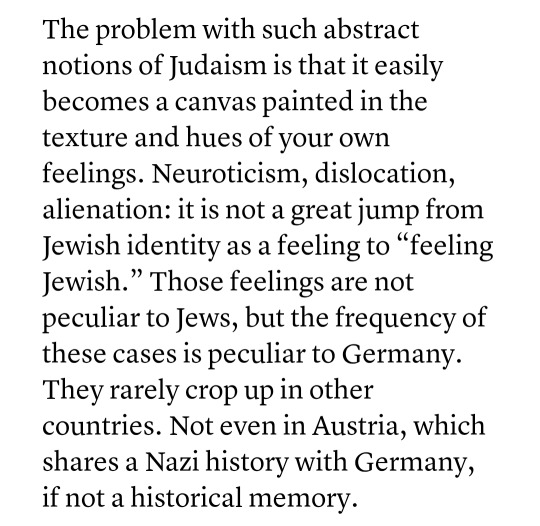
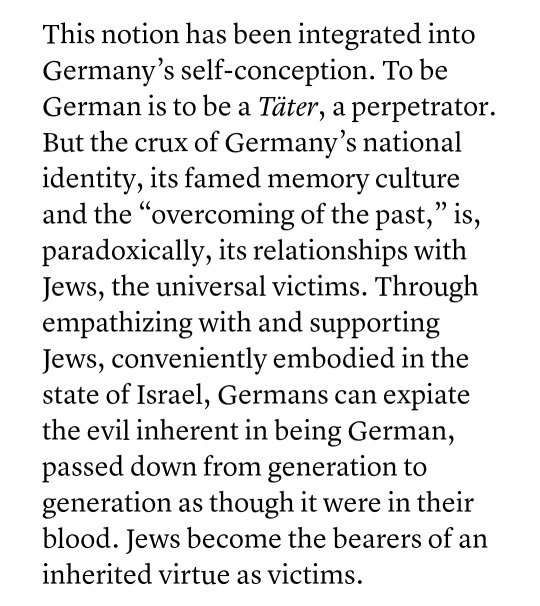
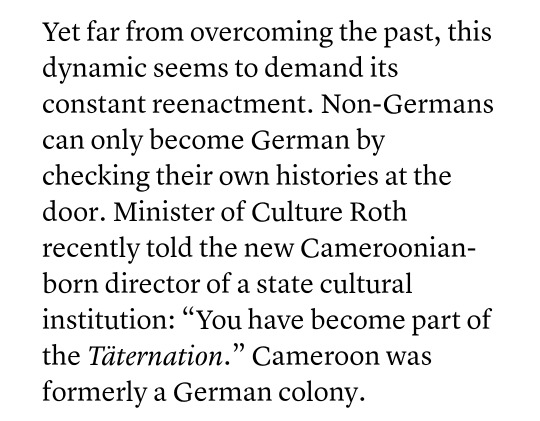
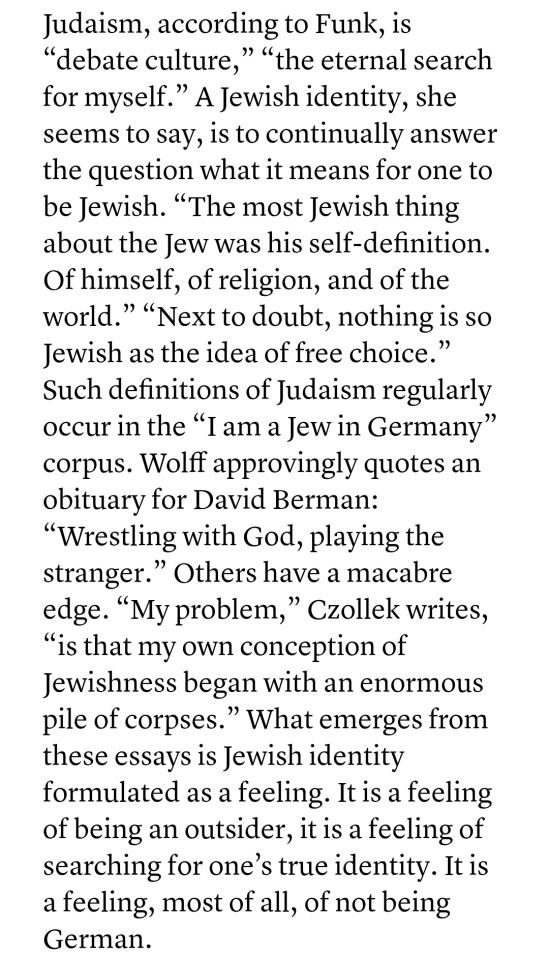
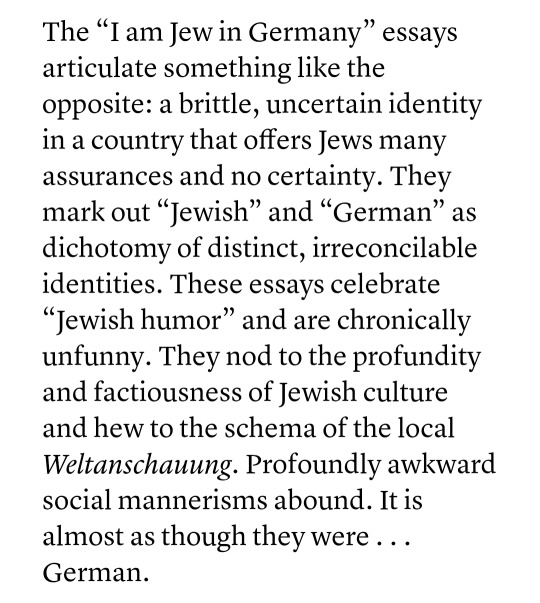
#German memory culture is so fascinating#Also to some extent french#My mother often claimed that we had Jewish ancestry and that a great-grandmother of mine was Jewish#Turns out she'd based that on ''Women talking a weird language'' coming to visit her grandmother#anyway after a whole round of genealogical research we learned that i actually have an Austria-Hungarian great-great-great#grandfather#that is; my great-grandma was talking her mother's home language with cousins that were from three towns over#and they spoke very bad Serbo-Croatian amongst themselves and often just switched to french#but my mother constructed in her mind this whole thing about us being part Jewish and she used to be fascinated by#Woody Allen Roman Polanski Claude Lanzmann the Marx Brothers Jewish humor etc.....#(My mother also spent six months in Germany as a teen during student exchange. i blame them)#But yeah this idea that since i'm neurotic and i had a big nose i was somehow secretly Jewish was drilled into me#She also thought that since my grandpa is Andalusian he probably had some Sephardic blood#Which. What exactly is supposed to be meant here by blood ??? Völk ? Blut ? one-drop rule ??????????#anyway this brand of philosemitism is becoming more and more repulsive to me#Jews are not an enlightened scholar-priest-stand-up-comedian caste with magical blood. They're an imagined community#Same as every other nation; religion; family; culture. Like everybody else they are as good or bad or interesting as imagination allows#And if we have to do weird philo-ism of an outgroup devoid of content let us do what writers have done for 500 years and#Write about talking animals#I'd rather we all collectively hallucinate the houyhnhnms as the quirky fun minority rather than cast real people in that role#or the pigs Napoleon was part of or whatever
22 notes
·
View notes
Text

😇 @bojan_cvjeticanin
#shut up#stop flirting on main#uugghhh why are they like this#also kris reading in serbo-croatian while the article is also available in slovenian?#bokris#kris guštin#bojan cvjetićanin
29 notes
·
View notes
Text
Admittedly I had awkward situations where I knew a language that I thought the other person also knew, but I didn't know how to "break the ice" so to say
#the best way is to just honestly say “do you speak X” in whatever the common language of the area is#the case I'm thinking of is hearing Serbo-Croatian in Germany and not being sure if I should say “do you speak Serbian/Bosnian/Croatian?”#so I just started speaking it and said “do you speak our? [language]”
8 notes
·
View notes
Text
ok now i need to figure out why were two serbo-croatian speaking women conversing exclusevily in english in this caffee. the convo wasn't being recorder for a podcast cause none of them had any technology on the table
#when the younger one was in the bathroom the older one spoke to the waiter in serbian and now that the older one left the younger one is#speaking to someone on the phone in serbo-croatian (the accent sounds not from serbia)#and their english was not that great#interesting#ura.txt
12 notes
·
View notes
Text
from the moment i heard guillaume (in the witcher dlc) speak i was like "OH that is a norwegian accent! that is 100% someone from southeastern norway speaking english!"
and it isn't! i looked up the va and he's from bosnia and herzegovina. and then i remembered i've made this exact same wrong assessment about the accent of people from bosnia and herzegovina before, which is really fascinating because our languages are not related at all
#i don't know if the actor natively speaks croatian or serbian or bosnian#but still norwegian is NOT a slavic language. norwegian and serbo-croatian in themselves do not sound similar#why do we sound so alike when speaking english! there's something about the front-of-mouth consonants and the lilt#slett's play
3 notes
·
View notes
Text
actually slavs know the most important thing: that tummy is life
#. just found this in my drafts hahsdjf#. this is about most slavic languages knowing a word derived from proto slavic *životъ that means either 'life' or 'abdomen; belly; stomach#. or in the case of russian and polish.... both#. wiktionary is not clear here so slovak; serbo croatian and slovene might also have words with both the meaning of 'life' and a body#. related meaning#langblr#lingblr#slavic languages#l#r.txt
8 notes
·
View notes
Text

Movie #61 of 2024: Hitman
I have a feeling this was the movie that prompted Olga Kurylenko to fight like hell to prevent her Bond girl character in Quantum of Solace from becoming a sex object.
#hitman#action#crime#thriller#xavier gens#skip woods#geoff zanelli#Laurent Barès#Antoine Vareille#carlo rizzo#english#russian#serbo croatian#35mm#2007#61
6 notes
·
View notes
Text
feeling normal emotions about "dušo" being a term of endearment that literally means "soul"
10 notes
·
View notes
Text
Servo-Crowatian
4 notes
·
View notes
Note
https://open.spotify.com/track/248Jb9J8zsegFBaROd66ie?si=fC5lTsQnRhK3QeF2bYHSQA%0A
May I suggest it as a jance song
Immediately added to the playlist, she slaps hard
✨From Kranj to Vrhnika playlist✨
#another playlist talk#you can save the playlist bc I have interesting song choices#I need to dig into more recs in Slovene and Serbo-Croatian (meant as whole SC continuum ofc)#otp asks#joker out#nace jordan#jan peteh
10 notes
·
View notes
Text
unfortunately intraslavic calques seldom produce interesting results, because all slavs are the same. you know what the proper serbo-croatian translation of polish 'kraków' is? 'krakov'. the proper translation of russian 'moskva' is—'moskva'. (both are already in use as exonyms; big surprise!) might as well combine us all into one country and call it a day. the biggest challenge would probably be figuring out how to distinguish the dozens upon dozens of different 'belgrades'
#to be totally fair#the fact serbo-croatian is among the most phonologically conservative slavic languages probably doesn't help
6 notes
·
View notes
Text
Wrt differences in national language internal to groupings that exist on a dialect continuum, I might go as far as to accept that they are actually different languages today - Swedish Norwegian and Danish, Gaelic, Irish and Manx, to pick the examples I'm most familiar with, might all be different languages today. But in these cases the national differentiation, i.e. the political decision that these languages are different along these particular national lines, precedes any actual discernable difference specific to those national lines. The nationalisation of languge is fundamentally political and artificial, and is profoundly not rooted in the supposedly ancient and authentic voice of the volksgeist to which they appealed.
#then there are some where the claimed national differentiation ought to be resisted eith all power#like the division of Serbo-Croat into Serbian Croatian Bosnian Montenegrin#clearly the project of a few insane genocidaires and which still isn't actually reflected in on the ground languge use
21 notes
·
View notes